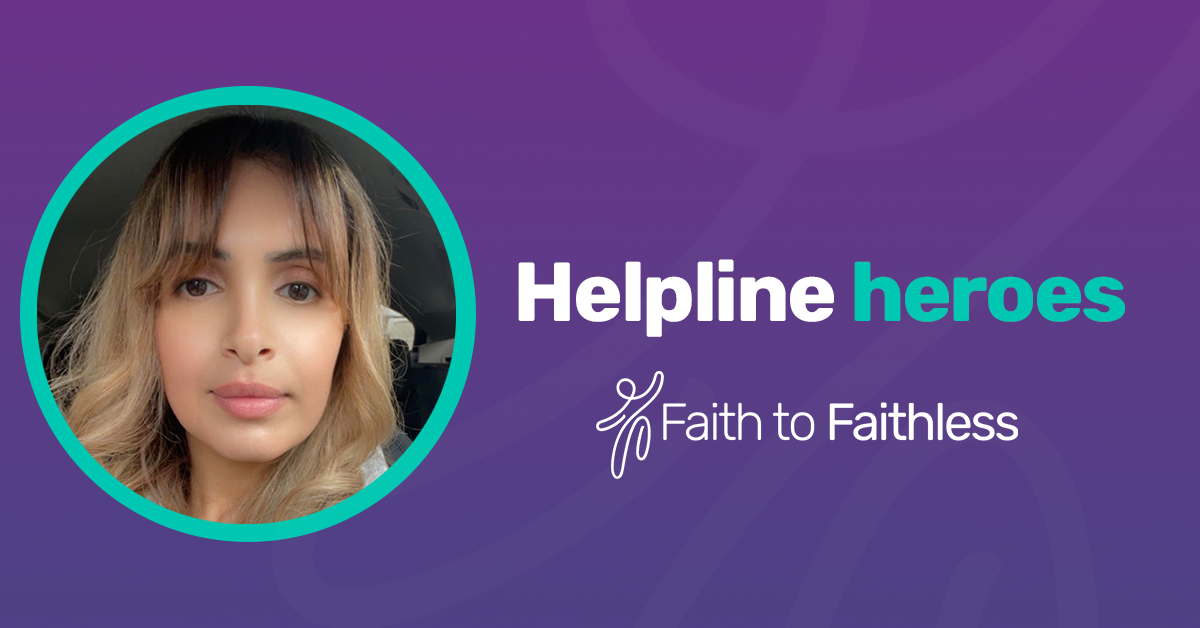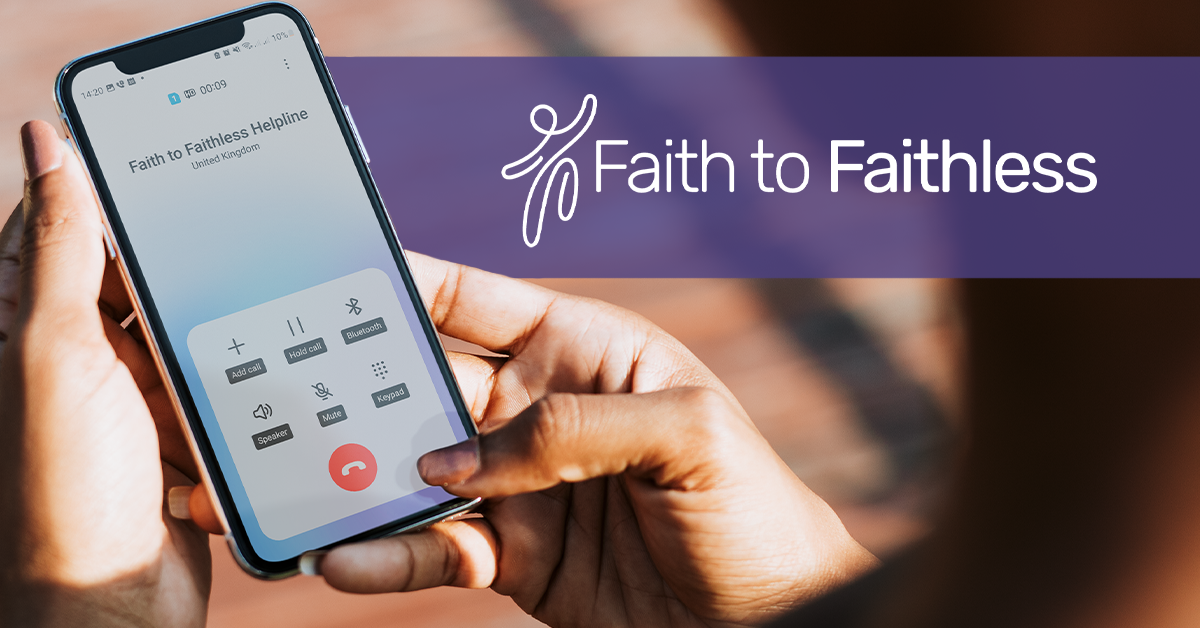
We spoke with Lya, a volunteer helpline operator for Faith to Faithless, our programme supporting people leaving high-control religious groups. Currently open three days a week, the helpline is operated by our team of highly trained volunteers who understand the nuanced challenges faced by ex-Muslims, ex-Jehovah’s Witnesses, ex-Evangelicals, ex-Mormons, and other so-called ‘apostates’. We caught up with Lya about her own experiences of leaving Islam, as well as training with Faith to Faithless, and her work providing a listening ear for people on their own journey of leaving faith behind.
Hi Lya! What inspired you to become a volunteer for the Faith to Faithless helpline?
As someone who left a high-control religion myself, I know what it feels like to feel isolated and alone after someone leaves their faith. Although I was fortunately accepted by my family when I came out to them as non-religious, I knew that wasn’t the case for most ‘apostates’. It made a big difference to my life when I found an Ex-Muslim group on Meet-up and realised that I wasn’t alone. It was through this group that I found out about Faith to Faithless, and the helpline. I decided to apply for the role. I became passionate about helping others who were in a similar situation to myself when I left the faith feeling alone and confused.
Could you describe the training you received to prepare for the helpline?
Before the launch of the helpline, we were invited to a three day residential training weekend in Leicester. We received intensive training during the weekend which included acting out various scenarios we could potentially encounter. We then received further online training and had to complete a safeguarding course. In addition, there was a call handling training session on how to use the call handling software. Before we took any real calls, we each had to do a mock call with a helpline staff member. It was really informative and in-depth.
What is your own experience of leaving a high-control religious group?
I grew up in a conservative practising Muslim family and was a practising Muslim myself for most of my life. At the age of 29, I started watching Youtube content by scholars known as ‘Quranists’ who interpreted the Quran differently to traditional Muslim scholars. I’d worn hijab most of my life, but after listening to the Quranists scholars, particularly one called Mohammed Shahrour, I was led to believe that hijab wasn’t mandatory in Islam so at the age of 29 I stopped wearing the hijab. I still very much believed in Islam, prayed five times a day, fasted during the month of Ramadan and adhered to other Islamic rules. I also dressed fairly modestly even though I was a non-hijabi at this point.
It wasn’t until I came across Youtube content by Ex-Muslims such as ‘Apostate Prophet’ three years later that I really began to doubt and question Islam. I binge watched some of the content by Ex-Muslims and honestly it didn’t take me too long to realise that Islam wasn’t true and that it was just another-man made religion. After leaving Islam, I wanted to tell everyone I knew about this discovery. I soon realised not everyone wanted to listen to what I had to say. My best friend at the time, who was a very liberal non-practicing Muslim, didn’t take it very well and our friendship ended. My immediate family, fortunately, were understanding and accepting when I presented them with the facts. It was difficult coming out to people around me as an atheist but I’m grateful for how far I’ve come in my journey and for all the good people I now have in my life.
Why do you personally think the Faith to Faithless helpline is important?
People leaving high-control religions often feel trapped and they feel as though they’ve got nobody to turn to or talk to about how they feel. The Faith to Faithless helpline gives them a platform to open up about their struggles with faith and the opportunity to speak with other apostates who have left high-control religions.
Do you consider yourself a humanist?
Yes, I consider myself to be a humanist. The thing that appeals to me the most about being a humanist is the ideas of tolerance, rational thinking and kindness towards others. I feel proud to be part of a movement that strives for a better, fairer and more tolerant society.
What would you say to someone who is thinking about calling?
Don’t hesitate to call, as the helpline volunteers are passionate about what we do. Almost all of us have lived experience of leaving a high control religion and we’re here to listen to you and support you as best as we can. One of the most common themes with callers is the social isolation that many of them experience when they leave a religion and their search for an alternative community. Most callers left religions where all the people in their lives were adherents of that religion, and as a result, they found it difficult to make friends or socialise with people. Often, I point them to the Faith to Faithless peer support group. Another common theme is religious trauma, for example callers stating that they still feared Hell even though they no longer believed in it. For callers who are experiencing religious trauma, I offer to send them information on religious trauma counselling.

Faith to Faithless helpline
The Faith to Faithless helpline is a groundbreaking service dedicated to supporting people who have left high-control religious groups. So called ‘apostates’ often deal with social isolation, mental health issues, discrimination, and estrangement from their communities and families. The helpline, operating three days a week and staffed by trained volunteers, offers bespoke assistance, resources, and empathetic support to a diverse group, including ex-Muslims, ex-Jehovah’s Witnesses, ex-evangelicals, and ex-Mormons. It aims to bridge the gap in understanding and support for apostates, providing a crucial lifeline for those navigating the complexities of leaving high-control religious environments.
Calls are free from all mobiles and landlines and won’t appear on itemised bills.
Wednesday 10:00 – 13:00
Thursday 16:00 – 19:00
Friday 08:00 – 11:00
Freephone: 0800 448 0748
You will also be able to email helpline@faithtofaithless.com for support, and emails will be replied to during our usual opening hours.
Notes
For further comment or information, media should contact Humanists UK Director of Public Affairs and Policy Kathy Riddick at press@humanists.uk or phone 020 3675 0959.
Faith to Faithless has been a programme at Humanists UK dedicated to providing specialist support to apostates since 2016. Beyond the helpline and its year-round provision of peer support from trained volunteers, the service offers awareness training to public services, including NHS divisions and police forces.
Faith to Faithless operates under a stringent safeguarding policy, prioritising the safety and wellbeing of all those reaching out for support.
Humanists UK is the national charity working on behalf of non-religious people. Powered by over 120,000 members and supporters, we advance free thinking and promote humanism to create a tolerant society where rational thinking and kindness prevail. We provide ceremonies, pastoral care, education, and support services benefitting over a million people every year and our campaigns advance humanist thinking on ethical issues, human rights, and equal treatment for all.
